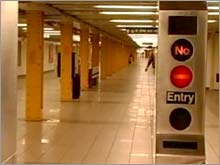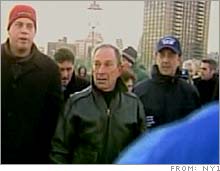 |
| A New York City subway station that was closed due to the strike. |
|
 |
| Mayor Michael Bloomberg walking across the Brooklyn Bridge the morning of the strike. |
|
|
|
|
|
NEW YORK (CNNMoney.com) -
The first transit strike in New York in 25 years is expected to cost the city hundreds of millions of dollars a day.
New York Mayor Michael Bloomberg estimated the cost at $400 million a day. The mayor made the estimate as talks dragged on this week between the union representing transit workers and the agency that runs the city's subways and buses. Those talks broke down late Monday, prompting the first walkout since 1980.
Janel Patterson, spokeswoman for the New York City Economic Development Corporation, said the mayor was using figures from Joseph Bruno, Commissioner of the City's Office of Emergency Management (OEM), who estimated the city would lose $440 million to $660 million a day from the strike.
That includes lost tax revenue of $8 million to $12 million each day, and overtime for police that costs about $10 million a day.
The office of New York City Comptroller William Thompson offered a lower estimate, saying the cost would be about $1.6 billion in the first full week of a strike, with a $400 million loss the first day.
Most of the impact of a strike, according to Thompson's office, would come from cancellation ticket sales, restaurant meals and other economic activity that can't be replaced.
The comptroller's office said its figures also account for economic activity generated by a strike: people staying in hotel rooms who would otherwise go home, consultants helping businesses with crisis planning and bicycle sales, for example.
For its part, Wall Street appeared ready for the strike. (Full story).
The Securities Industries Association was planning to hire buses to help carry about 12,000 employees of the big exchanges, brokers and investment banks to work in lower and midtown Manhattan, according to a report in the Wall Street Journal.
In addition, some firms were expecting a greater number of employees to work from home on Tuesday as the strike began.
The New York Stock Exchange opened during the blizzard of January 1996, which limited train and car traffic in the metropolitan New York area, as well as during the last transit-workers strike in 1980, the paper reported.
The New York Mercantile Exchange, which trades energy and metals futures, has also chartered buses and booked hotel rooms for essential personnel in Lower Manhattan and Jersey City, N.J., according to the paper.
Besides stopping buses and subways that carry an average of 7 million riders a day, the strike prompted the city to prohibit cars from entering most of the borough of Manhattan between the hours of 5 a.m. and 11 a.m. without at least four people in the vehicle.
Traffic was heavier than normal ahead of 5 a.m. with commuters trying to beat the deadline.
New York State Attorney General Eliot Spitzer was reportedly set to go to court early Tuesday to enforce an injunction against the strike by more than 30,000 members of the Transportation Workers Union Local 100.
The union could be fined millions of dollars a day and workers could be fined for two days of pay for every day of work they are on strike.
For CNN.com's coverage of the transit strike, click here.

|